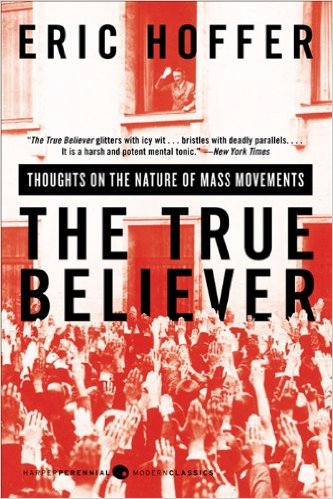 Buy the book here. See review by Scott Berkun.
Buy the book here. See review by Scott Berkun.
The famous bestseller with “concise insight into what drives the mind of the fanatic and the dynamics of a mass movement”
One foundation of philosophy is the question “Why do you believe what you believe?” it’s a core part of epistemology. We expect that the deeper we go, the firmer the answers become, but the opposite is true. Any child who continually asks “Why?” demonstrates, to the frustration of their parents, the further you go the fuzzier the answers get. It’s easy to discover that many of our beliefs are absorbed socially.
Belief might be primarily a social function, a matter of psychology and culture, rather than intelligence. And if it’s a social function, how can anyone who believes anything be sure it’s worth believing in? That a particular belief is morally, or even selfishly, good? Especially if they’ve never believed anything else? Are there different kinds of faith? How do you know what kind you have?
Hoffer takes on the entire notion of movements, political and religious, and attempts to cast a single net over the lot of them. The book is a polemic sweep over history, sometimes making unfair generalizations or skipping past obvious counterarguments.
The core theme of the book is a scathing view of human nature and the dangerous patterns of how we unite in society. It’s no accident Hitler is shown on the book’s cover, as Hoffer demonstrates how we, as a species, are prone towards mass movements. He explores the patterns and elements that build them, the psychological drives they satisfy, and the blind spots we have against reason while we’re in a mass movement. This has implications for everything: organizations, governments, religions, corporations and more. Consider sports teams, fandom of rock stars, nationalism, political campaigns and on it goes. The patterns he describes are offered as universal, suggesting this is simply part of who we are. Is it morally good to have 50,000 followers on twitter? Is the ambition to create a corporate brand known, or worshipped, by millions much different from a cult?
He never gets around to exploring the upsides of mass movements (or declaring he thinks there aren’t any. The book was written in 1951, before the U.S. Civil Rights Movement). Nor does he offer antidotes or countermeasures, which makes the book feel like a warning bell. Can a mass movement be moral? Can it have leaders who don’t, as he identifies, use the movement for their own advantages? He never gets that far, but perhaps he doesn’t need to. Reading the book will leave you with many big questions about who you are, which is all any curious reader can ask from a book.
Quotable quotes: It is a truism that many who join a rising revolutionary movement are attracted by the prospect of sudden and spectacular change in their conditions of life. A revolutionary movement is a conspicuous instrument of change. Those who would transform a nation… must know how to kindle and fan an extravagant hope.
One of the most potent attractions of a mass movement is its offering of a substitute for individual hope.
Faith in a holy cause is… a substitute for the lost faith in ourselves
If a doctrine is not unintelligible, it has to be vague; and if neither unintelligible nor vague, it has to be unverifiable. One has to get to heaven or the distant future to determine the truth of an effective doctrine.
Warning: when we renounce the self and become part of a compact whole, we not only renounce personal advantage but are also rid of personal responsibility. There is no telling to what extremes of cruelty and ruthlessness a man will go when he is freed from the fears, hesitations, doubts and the vague stirrings of decency that go with individual judgment.
The missionary zeal seems rather an expression of some deep misgiving, some pressing feeling of insufficiency at the center. The proselytizing fanatic strengthens his own faith by converting others.
Yes Edinburgh West has a website, Facebook, Twitter, National Yes Registry and a Library of topics on Scottish Politics, including Independence.
